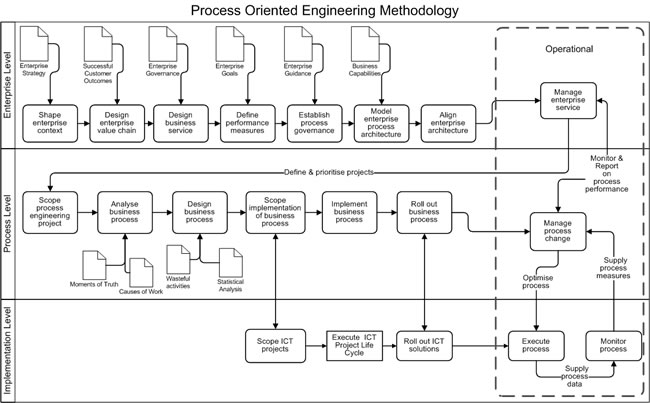For systems to be intuitive and adaptive in the process age, we need new thinking and purpose-built methods to work with processes. Simply extending or methods and practices of working with information won’t have the desired effect, because information oriented systems don’t have the necessary concepts to describe and use processes.A comparison of an information-oriented system to a process-oriented system lifts out these differences:
|
Data-Oriented
|
Process-Oriented
|
| Focus on storing and processing data. | Focus on executing a process. |
| Rules, decision logic and process rules are housed inside the technological solutions, maintained by IT people. | Rules and decisions are housed outside the technological solutions, maintained by business people. |
| Process modelling is used to design the system to enable the development of software. | Process modelling is used to execute work, because the models are translated into executable code. |
| Supports a technology design with data, network, workflow and business rules requirements. | Supports a business design with people, guidance, process and information requirements. |
| Success is a measure of delivering the expected work products. | Success is a measure of achieving the outcomes set by the customer. |
| Systems are used and managed by people to accomplish tasks. | Systems are used and managed by people to do work. |
| Execution caters for the predictable. | Execution caters for the predictable and the un-predictable. |
| Systems are shaped by technological requirements for automation. | Systems are shaped by business processes and services. |
| Development of systems includes writing of code that represents business requirements and models. | Development of systems includes generating code from business requirements and models. |
| IT people are involved in gathering requirements and developing IT systems and services. | IT people are involved in gathering requirements and developing business services. |
A fundamental part of realising the success of Integrated Business Management is an Enterprise Architecture that embodies all components of the organisation, their relationships to each other and the environment, and the principles governing its design and evolution.
Process-oriented solutions enable a business service and simulate human activity in a process. They go beyond the “input-process-output” representation and simulate a “customer-input-process-output-customer” process. It should even consider the customer’s customer.
During Requirements Management all five capabilities of an organisation must be considered to extract the full set of expectations for services, processes, products, rules and resources. These capabilities are the People, Guidance, Processes, Information and Resources. (See the article “Integrated Business Management in the Process Age”)
The requirements phase will consider the new view of the customer and incorporate the goals of the customer into the process requirements. Customer interaction is designed into the service and its supporting processes.
This phase will rely on the guidance of methodologies such as Customer Expectation Management, Business Process Management, Business Decision Management and Human Performance Management to ensure that all aspects of Integrated Business Management are incorporated into the organisation’s process design.
One of the most significant paradigm shifts is in the phase of Analysis and Design. Our view of processes and its relationships, behaviours and interactions have to adopt new thinking. Actually it is old thinking applied to a new environment.
Integrated Business Management
Methodologies such as Object Oriented Analysis and Design, Object Process Methodology and Service Oriented Design will guide us to not only think new about the design of processes and how it is contained in services, but also assist us with the analysis of the gathered requirements.
Another paradigm shift that changes the development of solutions is the Systems Analysis phase, where requirements and designs are translated directly into application architecture.
Current application development is based on highly-technical software constructs. There is no direct correlation between the desired result (a fully-operational solution supporting a business process) and the underlying technology constructs. Therefore, every application requires a cumbersome, error-prone, time-consuming systems analysis and design, where developers translate application specifications into the underlying technology model.
A process-oriented solution dramatically reduces the translation between business requirements and solution design by providing a model where software components directly correlate to the business processes they support. The business process is directly represented in the software architecture through the translation of process models into executable software, eliminating the need for exhaustive translation and software development. This is made possible by applying the disciplines of Automated Process Optimisation (APO).
APO also impacts the actual Implementation phase. Since the implementation is embodied in the process engine, the implementation activities are managed from the process and not from a physical implementation activity.
The Testing and User Acceptance phase is dramatically simplified for two primary reasons:
- There is no need to translate business specifications into the technology model, thus errors are eliminated.
- The business process is directly represented in the application architecture, thus application constructs are no longer hidden in code and are therefore easily modified and managed.
Testers and Users can easily point out flaws in the process flow and can focus on making sure that application integration and components work as designed.
The usage of solutions to perform everyday work must be Monitored and Managed. When designing the services and processes, ensure that the monitoring of process execution caters for the predictable and the un-predictable. The actual monitoring and measurement forms part of the process and is delivered through the implementation of APO.
The methodologies mentioned above and others, such as Human Computer Interaction and Artificial Intelligence, will shape the design of systems and the technologies we incorporate to satisfy both the concept of people using processes to do work naturally and that of processes shaping the systems.
In conclusion, I am ending of with Gartner’s view of what they have identified as the initial benefits companies seek when they deploy process oriented systems: reduction in elapsed process time, higher productivity per person, improved quality, reduced errors in processes, reduced number of steps in processes, higher employee satisfaction through process clarity, fewer people needed to execute processes, improved coordination across departments and geographies, automation of administrative tasks, reduced cost per transactions within process, enabling external users access to internal processes, improved regulatory and legal compliance, flexibility in processes, business agility, data and process integration across applications, reduced risk and finally … reduced waste and scrap. (From: Will the Real Business Process Management Systems Please Stand Up: Separating the Pretenders from the Contenders, Howard Smith and Peter Fingar, 2007)
Do these benefits sound like an eon of work? It shouldn’t be – if you are working with the right systems paradigm.
The following diagram is my interpretation of a method for developing process oriented systems.
 |

















